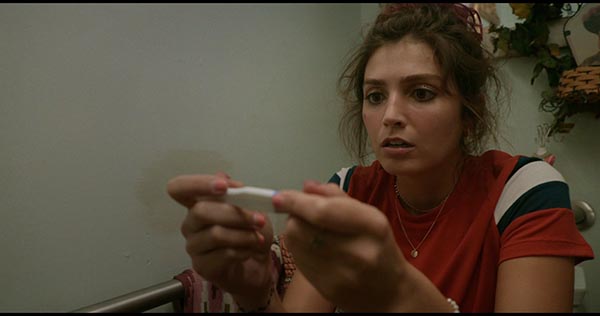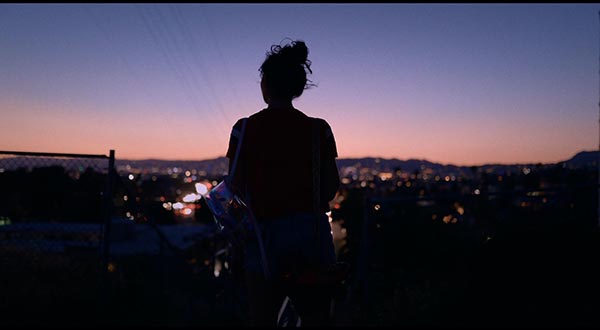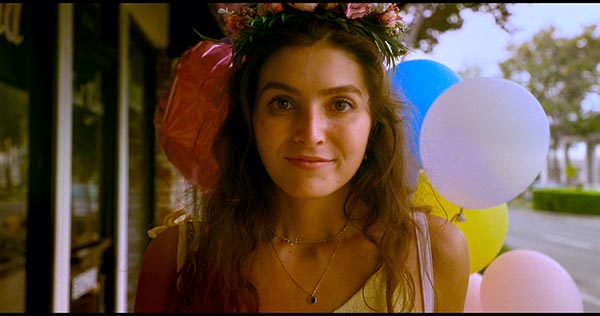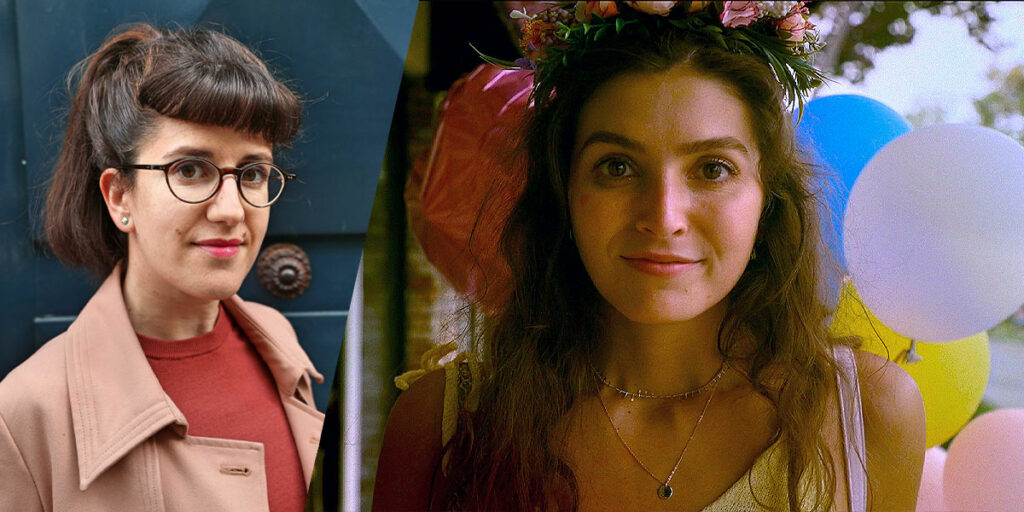Sophie Galibert ’s directorial debut Cherry had its world premiere at the Tribeca Film Festival and we got to interview the director and star Alex Trewhitt.
Cherry follows a 25-year-old woman, played by Alex Trewhitt (The Pom Pom Murders), going through an unplanned pregnancy in Los Angeles, where she only has roughly 24 hours to make one of the most important decisions of her life: keep the child, or have an abortion. Things get even more complicated when she’s fired from her job at a costume shop. She wanders around town, looking for advice from her boyfriend, friends, and family on what to do with this new dilemma she has to resolve. As she does this, she is confronted with having to learn how to be responsible for her own decisions. Cherry is an exquisite feature debut for director Sophie Galibert that delivers a fresh take on a well-known story and seeks to unpack what it is to grow up.
Cherry is one of those special films we don’t get enough of on a yearly basis that I would urge anyone to seek out once it hits a streaming service, or your local movie theater. Regardless of your gender, there is something for everyone to connect with here. Not knowing your place in the world, finding purpose, managing tricky family dynamics and friendships, having to embrace adulthood, and of course dealing with an unplanned pregnancy. Alex Trewhitt delivers such a charming performance that allows the audience to immediately fall in love with her character and persona. She also brings a great sense of relatability in the way she attempts to solve her issues that are believable and demonstrate just how messy and flawed we are as human beings, even at the age of 25. Galibert’s directing style shines as well, as she has to balance out the seriousness of the topic at hand with the more light-hearted tone the film carries for a majority of its runtime. To discuss the behind the scenes process of Cherry, we had the chance to sit down with Sophie Galibert and Alex Trewhitt for an interview after their big debut at the Tribeca Film Festival.
Sophie Galibert & Alex Trewhitt On Cherry ’s Tribeca Award & How The Project Came To Be
You guys won the Audience Award for Best Feature Film in its category for Cherry! How does it feel having the chance to share your work with others for the very first time and be rewarded in return?
Sophie Galibert: Yeah, it was very exciting and very rewarding! I think the Audience Award is pretty much the best award you can get because it’s directly the people who support you. So yeah, that was really the cherry on top of this selection because Tribeca was the first festival that we attended. I think it’s a good promise for the future of the movie, for Alex, and for myself: yes, we are very, very happy.
How about you, Alex?
Alex Trewhitt: Freaking out! It was awesome! [laughs] I had just left New York. I unfortunately got COVID in New York, and once I got home, I was like, “oh, I’m so bad,” and then, Sophie was like, “we won the Audience Award!” And I had, like, a brief moment where I was like… I swear the COVID was gone. I was like, “we have won!”
You were cured by the award.
A.T: No, it was just like, ah! It was awesome. I agree with Sophie too, I think it’s the best award we could have won.
Sophie, how and when did the idea for Cherry come to mind?
S.G.: I moved to Los Angeles five years ago. I had written a few features before, but I wanted to start from scratch. I wanted to shoot the movie in LA because I fell in love with the city and I wanted to share this love letter to Los Angeles. And I thought about what was the most, you know, crazy and challenging thing that happened to me, in my own life. I did have an abortion myself. So, I just started from that: from myself, and from my own experience.
I’m kind of a “Cherry,” I guess: I just used who I am and I shared a story that I actually hadn’t shared a lot, so that was another thing. I just realized that women don’t talk about that, and it seems very taboo, so I thought that I had to do something. I had to share my story in a way that might encourage other women to share their own. We developed the screenplay with Arthur [Cohen, co-writer] for more than two years, and we had different versions of the story. Anytime I was teaching my project, or just talking about what the story was about, I had women starting to share their own stories. Not only about abortion, but about miscarriage, or difficult pregnancies, or baby blues: so many stories that women tend not to talk about. If this movie can encourage other women to tell what it is to be a woman, we want to hear their stories. You know, I think there are a lot of stories that still need to be told.

What Cherry Does Differently From Other Films
A lot of films that tackle this subject matter usually focus on teenage girls, like in high school, going through an unplanned pregnancy. Films that come to mind are Never Rarely Sometimes Always, or Unpregnant. Why center this story around a grown woman in her mid-20s, and what do you believe this does differently compared to other similar films?
Sophie Galibert: Actually, it happened to me at twenty-five. So, I just decided to have Cherry be the same age as myself. We thought about making her younger or older, but I think twenty-five is actually an age where you could keep a baby and become a mother, but it’s a weird age. I didn’t want the audience to know what her final decision would be. And so, I thought, “okay, if she’s too young, it might be too obvious that she’s not going to keep it, but if she’s too old it may sound weird that she’s not actually keeping it.” I was just trying to find a fine balance, and I think, today, in LA, twenty-five is an age where you could kind of go both ways.
Alex Trewhitt: Oh, for sure! You are messy at twenty-five! If you’re like a Cherry type of gal, you are messy at twenty-five. Can speak from experience.
I feel like there’s this misconception that, when you’re in your mid-20s going to your 30s, you should have your entire life figured out. So, I thought this was a really nice change of pace in discussing this topic.
S.G: It’s moving, you know? You think you have to have your life all figured out at twenty-five, and then you tell yourself, let’s wait till thirty. And then you reach thirty, thirty-five, and it seems like… Life is just messy. All along the way. And then we die, and that’s it. [everyone laughs]
Alex, how did you get involved with the film? Was it one of those cases where you were just called for an audition?
A.T.: Yeah, it was super normal. I guess it was normal for the time, right? I got the audition tape from my agent in July, 2020, maybe? I had gone back home, you know, mostly to keep my grandparents inside, and was there, so I did my tape. We had my callback on Zoom and then, I don’t know if it was Sophia or Jasmine [Gutierrez], our casting director, who was like, “hey, so can we get a video, like an iPhone video, of you on roller skates?” And I was like, “I don’t know how to skate, but yeah, we’ll figure something out!” So, I went with my little sister to a roller rink that just happened to be open. We were the only people in there, and then I sent this really pathetic video going up one lap around. I didn’t even know how to stop! And I was like, “I hope this works. Thanks!” [waves]
S.G.: And then you crashed on the wall.
A.T: I absolutely crashed on the wall! [laughs] So, then my agent called and was like, “they really loved you! They want to go with you! However, it’s all contingent on how you do on these two skating lessons they could set up for you.” And I was like “oh, no!” [laughs] But it was great. They set me up with the LA Roller Girls and my coach was was incredible. We trained for six weeks and then started shooting.
Did you know what the film was about going into the audition, did it have any influence in you wanting to pursue the role?
Alex Trewhitt: So, I saw… [talking to Sophie] I don’t know if you said abortion in the breakdown or not?
Sophie Galibert: I think maybe we showed the synopsis. Of course we wanted to make sure that people were aware, so I guess, when we sent the lines, we shared what the movie was about. Yeah, we didn’t want people to step away.
A.T: Well, when I read it… Obviously you get a lot of auditions where you’re like, “ugh, okay, I’ll read for this,” like, great. Give me all the auditions: I will do all of them! But some of them you’re more excited about, right? So, I think that one scene I read was with Nick and the breakup scene, and then another scene was the Mother’s Day brunch with the family. My sister is my favorite person in the world, and I loved the sister relationship, with the little snarkiness. It was just so dynamic. I love how Cherry is just full of contradictions. She’s funny, and she has so much heart, and it’s really rare that you get to step into these women and show them to the world. So, I was really excited just because this woman wasn’t just a one dimensional character. I got to really show all sides of her .
S.G: We shot this movie in seven one-shot sequences. We shot for 15-20 minutes. So, when we did the audition, we wanted to make sure that Cherry, and Alex, would be able to handle such a long take. That was something we were looking at and so the slides we sent were 10 pages long! I mean, I’m not sure if it’s very common?
A.T: No, that is not normal! [laughs]

S.G: We asked for tremendous work, and as I was watching all the self tapes, I wanted to thank everyone personally, because those people spent so much time recording 10 minutes of self tape, which is crazy! And with the rolls getting in, I kind of stalked Alex on her socials [smiles], and I saw that she was traveling, she was a badass… She seemed like a fearless person! When we saw that she didn’t really know how to skate, we knew that she could pick it up. She did pick it up, and we saw that in only a few days. She was able to improve her level very fast, so we knew that in one month she would have been able to manage.
Sophie Galibert & Alex Trewhitt On The Themes Of Cherry & What They’re Most Proud Of
There are so many great moments and lines in Cherry, one of my favorites being “it’s not in our bucket list of things to do in life” said by the doctor at the beginning of the film referring to abortions. What’s a particular aspect of Cherry that you are personally proud of as a performer or writer/director that you’d like people to remember your work for in this film?
Sophie Galibert: What I think we did succeed in, and I think I’m going to keep working on, in terms of character, was making her very clumsy, but at the same time, a real person. She lacks confidence but sometimes she doesn’t show it, and she can oversell everything. I’m proud that we managed to have a character that is real, but it’s sometimes so imperfect, you know? I see that all the time. How this world is so absurd, and I see myself in situations that are so embarrassing, and I think this is what she’s going through, you know? All these moments where she’s lying and she doesn’t realize that the guy can see her. Everyday there’s this kind of thing happening, where you feel like, “why is it happening to me?” I like this kind of character who is kind of struggling, like Charlie Chaplin: he’s doing his best, but it’s not working, and he’s going to fail, you know? It’s fine. It’s life. I like these heroes because they’re exactly who we all are. We don’t have super powers: we are just trying to survive everyday, and it’s funny to laugh about that. I like not taking life too seriously: the world is kind of f*cked up!
Alex Trewhitt: Yeah, I think that everyone can relate to some part of Cherry. And that’s really special: that’s what I really love about movies – identifying, and understanding, and relating. I think we all do because then we all feel less alone. And so far, everyone who I’ve talked to who has watched our movie or talked to me about it has found something, whether that’s like, “hey, I have a shitty relationship with my dad,” or, “I have an interesting relationship with my sister.” There is something for everyone. Sophie did a really beautiful job showing all of these people in an honest way. And I think that that is something really rare and really special.
Anytime Cherry visits one of her friends or loved ones it feels like short chapters or vignettes in her journey. What were the most meaningful character interactions to shoot? And which one is the most impactful one in Cherry’s arc?
Alex Trewhitt: It has to be the Mother’s Day brunch scene, because you very quickly see their family dynamic. You see the relationship with her mother, her sister, and her grandmother. Our grandmothers are very important people to both Sophie and myself. And even though she’s not all there – you know, she’s suffering from dementia – she is still the first person who Cherry feels like she can tell. I think that really says a lot about how much trust she has for everyone and how she navigates her family dynamics.
Sophie Trewhitt: I think you’re right. It’s funny, because, when we were scouting this house, I was talking with the owner about the casting process. As soon as I felt that a person was someone we would work with, I always used to tell the story: “by the way, this is a story about pro-choice.” So, when I told the owner the story of the film, he was like, “but why does she not tell her mother?”, I guess we’re always kind of scared of our parents’ reaction. Even as a grown up you’re always afraid of it. You always want your parents to be proud and you finally need to be reassured that everything’s fine. So, you tend to kind of change reality and not tell everything. I think you’re right, Alex, the family brunch is a very important scene. It’s the scene where the most things are said, compared with other scenes where she’s kind of always avoiding a lot of things. It’s also awkward. It’s, in a way, kind of dark, even though it’s outside so it’s a very sunny scene, but what’s going on is sad. For me, that conversation with [her father] is really the key for her decision: she has really touched rock bottom at this point, and then she goes back to the surface with her decision.

Sophie Galibert & Alex Trewhitt On How Relevant Cherry Is Today
It goes without saying that Cherry is especially relevant right now, given this country’s unfortunate situation when it comes to abortion and women’s rights. What is something you’d like all audiences to take away from the film in regards to this topic? And, if you feel comfortable, would you like to make a comment or send out a message in solidarity with women who may need to hear this story right now more than ever?
Alex Trewhitt: Absolutely. It is horrific and such a crime to humanity what is happening right now and what I really hope is that, when people watch our movie or talk about our movie, it comes across that Cherry is not a villain and she’s not a victim. Nothing horrific has happened to her. She hasn’t been raped. There hasn’t been incest. It’s just truly an accident. Right? And that is what happens to so many women. She understands the gravity of the situation. She knows that this is a big deal. It’s not that we’re minimizing that, but we allow her to make this decision based on what her life is, and what’s best for her, and we trust her with that. Anyone could be Cherry. Everyone knows a Cherry where it’s like… maybe they just don’t talk about it. You know, I don’t know if Cherry goes on to tell her best friends, or anyone else. Because really, it’s her decision, and it’s not wrong. I want people to just see that it could happen to anyone, and that’s okay. It’s okay to deal with it, however, they’re going to deal with it. And we just shouldn’t villainize people.
Sophie Galibert: Yeah, what’s going on is pretty crazy. I’m still processing it in my brain. I think I would like to say to the women who might seek an abortion in the future that you’re not alone. And you won’t be stopped. I mean, obviously, a lot of states are likely to take measures to help us women. So, it’s really tragic, but at the end of the day I don’t think pro-life people will win, because women will find a solution, like they always did. It’s really sad to step back like that and to treat women like kids, because, if you remove their freedom to make a decision for themselves, you treat them like kids. I mean, what’s the next step? To open a bank account with their husband’s name on it? Or to prevent them from driving a car? What is the next step if you treat women as kids, you know? I think we should trust women and entrust that they know what’s good for themselves. But what I would like to say is yeah, that you’re not alone. We are here and there are a lot of women who went through the same thing. I’d like to encourage women to also share their own stories and really open up: there are so many other subjects that we don’t talk about, and I don’t know why it’s so taboo. You know? It’s very taboo to be a woman. [shrugs]
This interview has been edited for length and clarity.
Cherry premiered at the 2022 Tribeca Film Festival on June 11, 2022. Read our review of Cherry below!

